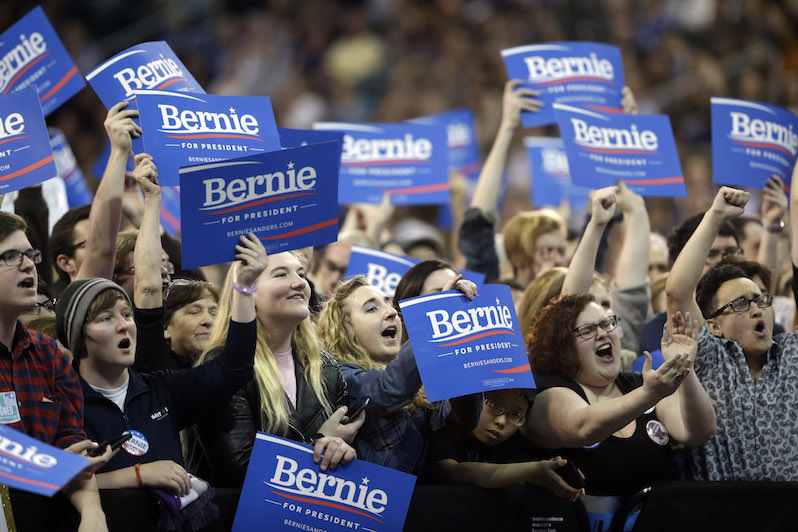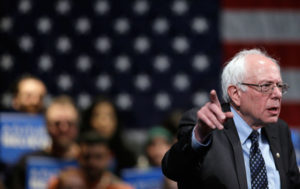Win or Lose, Will the Sanders Movement Last Beyond Election Day?
With millions of young people supporting the candidate, American politics could change for the long term. Some observers are even predicting that the campaign will become an incubator for the Democratic Party's future politicians. Young people cheer during a Bernie Sanders rally. For many in the 18-to-29-year-old age range, his presidential campaign is their first dip into politics. (Jeff Roberson / AP)
Young people cheer during a Bernie Sanders rally. For many in the 18-to-29-year-old age range, his presidential campaign is their first dip into politics. (Jeff Roberson / AP)
How do the millions of young people supporting Bernie Sanders for president see the future of their movement? Do they think it will make a lasting difference in American politics beyond Election Day? Will it change their lives?
In my career, I have reported on such movements many times before — most recently with Occupy Wall Street — and lately I have been wondering whether the enthusiasm of the current generation will last beyond Election Day.
It has happened before: for example, when Occupy veterans moved into the Sanders campaign, and when DeRay Mckesson, a leader of the Black Lives Matter movement, jumped into the race to become mayor of Baltimore.
In Michigan’s primary last week, Sanders won the 18-to-29-year-old vote by a big majority — 81 percent, according to one postelection poll. For many in that age range, the Sanders campaign is their first dip into politics, just as the anti-war movement was for an earlier generation coming of age during the Vietnam War.
“I do think that you’ll see people running for office, to be on school boards, be on commissions, and working to change the system from within,” Mckesson told Patt Morrison of the Los Angeles Times.
In addition, Ryan Lizza of The New Yorker wrote recently, “With Sanders winning young voters overwhelmingly, his campaign may eventually be seen as an incubator for the [Democratic] Party’s future politicians.”
To learn more, I pulled up a list of organizers in College Students for Bernie.
I emailed Brendan Eprile at Oberlin College — a politically active campus that is actually both a liberal arts college and a conservatory of music, about 35 miles from Cleveland. (Interestingly enough, Oberlin is the alma mater of Adrian Fenty, the mayor of Washington, D.C., from 2007 to 2011, as well as Stephanie Rawlings-Blake, the current mayor of Baltimore.)
The Ohio primary was days away at the time, and Oberlin’s Sanders supporters there were busy.
Here’s what Eprile told me in an email:
At Oberlin, we have started a college chapter called Oberlin Students for Bernie Sanders. In that chapter we host weekly meetings. We’ve raised awareness by planning events and putting up flyers, and we have participated in extensive phone banking. …
Overall at my school I would say there is overwhelming support for Bernie Sanders. When I started the chapter in the fall I was not expecting the level of support we have received. I’d say as Bernie’s campaign has continued to grow nationally, it has grown at my school as well. We use multiple mediums to communicate with each other such as Facebook and Slack and we have had many students stepping up and taking a leadership role in the movement.
I think there is something special about the Bernie campaign in terms of how young people have gotten involved. I have never heard of a presidential candidate that has inspired so many young people to actively participate in a political campaign. I have friends who spend hours of their free time phone banking for Bernie’s campaign.
I truly believe that even if Bernie Sanders does not win the nomination, he has still changed the way the country views politics, especially the youth. I think Bernie’s grassroots approach has really struck a chord with the American people. Bernie Sanders has made it this far not because he has the support of the establishment or Super PACs but he has the support of the American people. It has been inspiring to help out in a campaign where we can see that we are actively making a difference.
I also talked to students at Occidental College in the middle-class Eagle Rock neighborhood in the heart of urban Los Angeles. Occidental is another campus that is famous for political activism, producing leaders as diverse as Barack Obama and Jack Kemp, the professional football quarterback who became a congressman and conservative idol.I interviewed Carson Malbrough, a 19-year-old African-American student majoring in politics there. Malbrough told me that he grew up in the Watts-Willowbrook area of South Los Angeles, a working-class neighborhood of African-American and Latino families.
He said:
The environment [at Occidental] is one that is socially conscious and aware, and his [Sanders’] populist message resonates. His progressive agenda is one that fits in with Occidental. We have a long history of liberal-minded activism and professors who do advocacy work outside.
Whether or not Sanders wins the presidency, he still wins. Many people say that means he moves Hillary to left. That’s not what I mean. He brings up issues of corrupt campaign financing as well as massive income [inequality], stagnation of wages to a point that is almost criminal and a system where wealth equals influence, which is contrary to democracy.
People say their voice doesn’t matter and the system is rigged against them. His whole message is one that seeks to empower the working class, the blue collars, and this neighborhood [around Malbrough’s home] is a highly blue-collar area. The most significant point he brings up that would affect our community is the $15 minimum wage.
Residents of this area are working one or two or three jobs, a crime. They are trying to get by with their families. It hinders how active of a role, for the older workers, they can play for their kids because they are working around the clock just to survive. They don’t have the time to provide for their families and to help their kids. Younger kids go to work right away or they mix low-wage jobs with school. They could be meeting with professors, or study groups or some worthwhile activities. But they work because they have to help out their parents.
The issues Bernie Sanders brings up … may seem like radical ideas but my children, years from now, these are things they will appreciate and maybe even take for granted.
Malbrough scoffed at the notion that Sanders’ proposals are unachievable.
“They are only unachievable because they require change in the status quo,” he added. “That’s what makes Bernie Sanders exceptional. He sees this as an opportunity to challenge the status quo.”
Eprile and Malbrough are just two voices in a campaign involving thousands of paid workers and volunteers and millions of voters. But if the Sanders movement is to continue beyond Election Day, it will require people like Eprile and Malbrough to lead the fight in the neighborhoods, city halls and statehouses as well as in Washington.
Sanders has to remember them after the election. He likes to say he is leading a revolution. For this to be more than words, it means creating a national organization to campaign from the ground up against not just the financial industry’s chicanery but also against the low wages that force parents in Carson Malbrough’s South L.A. neighborhood to work three jobs.
“There is no doubt that Bernie Sanders’ presence has changed the national conversation on national priorities and the direction the country is moving in,” Peter Dreier, one of Malbrough’s professors at Occidental and an expert in political organizing, told me.
He added:
It is clear it has changed Hillary Clinton’s talking points. He has defined the agenda, not Hillary. In many ways, he is more in sync with what the American people are saying: that the rich have too much power, the rich don’t pay their fair share, all those things. But none of that means the Sanders movement will continue after the election unless there is an effort to invest in some sort of apparatus. … There are lots of talented organizers he has hired as part of this campaign. If he can keep 50 of them employed to keep momentum going, he will have even more of a presence.
Sanders is bringing a new generation into politics, people who will enrich the country’s public life. It is a heavy responsibility for him, and that responsibility will certainly continue long after Election Day.
Your support matters…Independent journalism is under threat and overshadowed by heavily funded mainstream media.
You can help level the playing field. Become a member.
Your tax-deductible contribution keeps us digging beneath the headlines to give you thought-provoking, investigative reporting and analysis that unearths what's really happening- without compromise.
Give today to support our courageous, independent journalists.






You need to be a supporter to comment.
There are currently no responses to this article.
Be the first to respond.